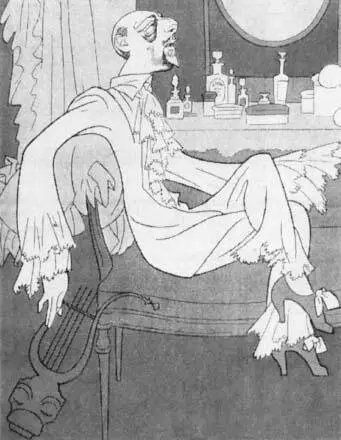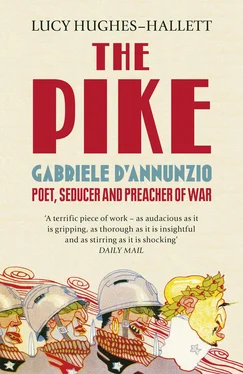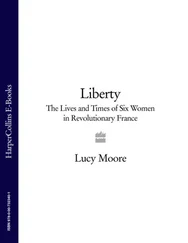Afterwards Saba posts his precious manuscript. He gets no response. D’Annunzio does not pass his poems on to anyone. He doesn’t even send them back.
September 1909. The Brescia air show: for most of the 50,000 people present their first sight of the amazing spectacle of a man aloft in a flying machine. It is only six years since Wilbur and Orville Wright made their first powered flight, thirteen months since Wilbur first demonstrated their Flyer I in Europe, barely six weeks since Louis Blériot (who is here at Brescia) flew across the English Channel, crash-landing in a vertical fall of sixty-five feet to arrive, with a smashed undercarriage but himself unharmed, in a meadow near Dover Castle. D’Annunzio is ecstatic. Humanity’s conquest of the air, he proclaims, presages, ‘A new civilisation, a new life, new skies!’ A poet is called for, ‘capable of singing this epic’. That poet must be himself. He stages a poetry-reading-cum-press-conference-cum-photo-opportunity at Brescia, reciting verses for the assembled journalists and photographers. The poem, about Icarus, was first published ten years previously: d’Annunzio has been dreaming of flight since he was a schoolboy.
He is at Brescia to gather material for his next novel. He is also planning, courageously (already several aviators have died), to cadge a ride. Now he is being observed by Franz Kafka and his friend Max Brod. The two are holidaying together on Lake Garda. Kafka is depressed: his inspiration has deserted him; his stomach feels to him like a person on the brink of tears. To get him writing again Brod suggests they compose competing accounts of the air show.
The two young men are in the immense crowd on the parched airfield. They both notice d’Annunzio among the ‘sparkling ladies’ and gentlemen on the stands. Brod is struck by d’Annunzio’s ‘feminine charm’, and finds him ‘marvellous through and through’. Kafka is less impressed. By his account d’Annunzio is ‘short’, which is the simple truth, but also ‘weak’ (which may be another way of saying ‘feminine’). Kafka notes that d’Annunzio is ‘skipping’ among the ladies and ‘shyly’ trotting around after Count Oldofredi (one of the show’s organisers).
D’Annunzio isn’t shy, but his body language can be deferential, his posture placatory and insinuating. (Photographs show him with his head dipped slightly to one side, leaning in towards a companion.) Oldofredi is his host for the day, whose consent he must have before he can fly, but he is no ordinary supplicant. To Brod it seems that at Brescia the bigwigs are treating him ‘like a second King of Italy’.
Later that day he makes two short flights, as passenger to the American aviator Glenn Curtiss and the Italian Mario Calderara. He poses for the cameras in a leather flying helmet. Immediately upon landing he gives an interview to the reporter for the Corriere della Sera (his flair for self-promotion never leaves him). Flying, he says, is divine; so divine that even he, the divo of words, is for the moment at a loss as to how to describe it. It is as ineffable as sex.
Increasingly bellicose and nationalist in his politics, d’Annunzio sees – years before the military establishment begins to invest in aviation – the strategic potential of the new flying machines. In the following year he will repeatedly deliver (for handsome fees) a lecture on the need for Italy to achieve Great Nation status by seizing control of the skies.
1910. The bailiffs are in d’Annunzio’s house in Settignano. Pursued by his creditors, himself in pursuit of a long-legged Russian countess with a lovely singing voice and a complaisant husband, announcing to the world that he needs to visit a French dentist, d’Annunzio has decamped to Paris. There his arrival causes quite a stir: he has been a bestselling author in France for two decades. At once he begins to circulate in society, and those he meets are recording their impressions.
He is forty-eight now. To Gide he seems ‘pinched, wrinkled, smaller than ever’. Certainly he needs a good dentist. He has ‘funny little crenellated unhealthy teeth’, notes a French actress on whom he tries his charm. ‘He is the only man I have ever seen with teeth of three colours, white, yellow and black.’ As he has aged his aura of sexual ambiguity has become more marked, intriguing to women, repulsive to most men. (See overleaf.) Several of his new acquaintances remark on his narrow, feminine shoulders and wide womanly hips, his little beringed white hands, his fussy fluttering gestures, his extravagant compliments. ‘An unprepossessing figure,’ notes René Boylesve. ‘He enters like a character from an Italian comedy; one could easily imagine him with a hump.’
For all that, for some he is irresistible. Isadora Duncan testifies that the woman courted by him, ‘feels that her very soul and being are lifted as into an ethereal region where she walks in company with the Divine Beatrice’. The young English diplomat Harold Nicolson, discussing d’Annunzio with two equally snobbish European noblemen, decides that the petit-bourgeois poet is ‘a chap one couldn’t know’, but, having heard him declaim his verses in an aristocratic drawing room, the bisexual Nicolson is instantly besotted. Nicolson leaves the party abruptly and walks along the quays, ‘still fervent with excitement’, d’Annunzio’s voice ringing in his ears ‘like a silver bell’.

There are Parisians who see beyond the bewitching surface. D’Annunzio accepts advances for books he will never write. He decamps from hotels leaving bills unpaid. Maurice Barrès, the French nationalist writer whose work d’Annunzio has correctly been accused of plagiarising, plainly sees the self-serving, exploitative side of the poet. ‘He is like a bird which scratches about for seed with its hard beak … this hard little soldier, this grasping conqueror, pecking and hurting the palm of my hand.’ Others sense his weariness. His greatest loves are past; his best poetry is written; in leaving Italy he has lost his role as national figurehead. The flamboyant homosexual Count Robert de Montesquiou has taken him up, and is introducing him to Parisian high society, but notices that occasionally his mask drops. Then one sees ‘something withered … the nostrils become deformed like those of a face on a shield that has been dented in combat, and the corners of the mouth express unutterable horror’.
Diaghilev’s Ballets Russes are in Paris, performing Cleopatra, choreographed by Fokine with designs by Léon Bakst. The title role is mimed by Ida Rubinstein – a bisexual Russian beauty. She comes on in an immense blue wig and drifts of diaphanous, gem-scattered gauze, most of which she sheds before the evening is out. D’Annunzio is in the audience with de Montesquiou. After the performance they go backstage, where Rubinstein is holding court still clad only in massive ‘barbaric’ jewellery and an exiguous amount of chiffon. Barrès is there, and Edmond Rostand, and other literary luminaries, all in evening dress. D’Annunzio takes up the story. ‘Seeing at close quarters those marvellous naked legs, with my usual boldness I threw myself to the ground and – quite oblivious of my swallow-tail coat – kissed the feet, rose, still kissing, from the ankle to the knee, and up along the thigh to the crotch, kissing with lips as swift and supple as a flautist’s scurrying over the stops of a double flute. Tableau! Scandale!’ The bystanders are embarrassed. Rubinstein is amused. D’Annunzio lifts his eyes (even when standing upright he is a good six inches shorter than she) and sees, beneath the great tangled blue cloud of false hair, that she is smiling, and that she has a ‘dazzling’ mouth.
Читать дальше













